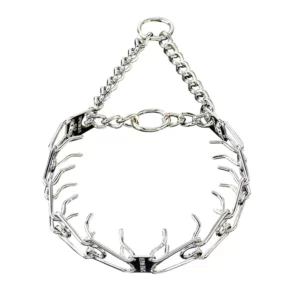When it comes to dog training, there are numerous tools and techniques that trainers and dog owners alike utilize. One of the most controversial yet commonly used tools is the prong collar. It is a subject that has sparked a multitude of debates, particularly concerning its efficacy and safety. In this article, we aim to delve into the details of prong collars: what they are, how they work, and the pros and cons of using them.
What is a Prong Collar?
A prong collar, often known as a “pinch collar,” is a type of training collar used for dogs. It consists of a chain with prongs spaced evenly around it, which rests against the dog’s neck. When the leash is pulled, the prongs provide pressure in unison that discourages undesirable behaviors.

No Bad Dogs Official
How Does a Prong Collar Work?
When applied correctly, an even amount of pressure around the dog’s neck. Unlike traditional choke collars, which can put a concentrated amount of pressure on the front of the neck, the prong collar aims to minimize harm by evenly distributing the pressure.
The sensation from the prongs is meant to simulate the natural corrective behavior exhibited by a mother dog toward her puppies. It is not designed to harm the dog but rather to serve as an attention-getter. In this way, the prong collar can be an effective tool for communication between the dog and the owner or trainer.
Pros of Using a Prong Collar
Quick Results
Many dog owners report seeing immediate improvements in their pet’s behavior when using it correctly. This is especially true for dogs that have not responded well to other training methods, such as positive reinforcement.
Adjustable Pressure
Allows for adjustable pressure, making it a flexible tool for different types of dogs and behavioral issues.
Temporary Use
In many cases, this is the only needed temporarily to correct specific behaviors. Once the dog is trained and understands commands, owners often switch to a regular collar for everyday use.
Cons of Using a Prong Collar
Potential for Harm
If not used correctly, it can cause physical harm to the dog, including damage to the trachea and neck. This is especially true if the collar is too tight or used with excessive force.
Over-correction
Because it is so effective, there is a risk of over-correcting the dog. This can lead to stress, fear, or even aggression.
Not Suitable for All Dogs
Prong collars are not advisable for very young puppies or dogs with medical issues affecting their neck or spine. Some dogs are sensitive to pressure and could benefit from an alternative training collar.
How to Use a Prong Collar Safely
Consult a Professional: Before using it, consult a professional dog trainer who is familiar with this tool. They can instruct you on proper fitting and use.
Proper Fitting: Make sure the collar is the correct size for your dog and that it is placed high on the neck, just behind the ears. The prongs should be facing inward but not digging into the skin.
Leash Control: Use it with a leash that allows for quick corrections without excessive force. A sudden, quick tug is generally more effective and less harmful than a sustained pull. We recommend a 4-foot training leash.
Monitoring: Continuously monitor your dog for any signs of discomfort, distress, or injury. If you notice any adverse effects, discontinue use and consult an experienced trainer.
Training: Always use as part of a balanced training program. It should not be the sole method of correction but rather be used in conjunction with rewards and positive reinforcement.
Frequently Asked Questions About Prong Collars
In addition to the above details, there are commonly asked questions about prong collars that many dog owners ponder.
Is a Prong Collar Painful for My Dog?
The sensation from a prong collar is designed to be uncomfortable rather than painful when used correctly. However, incorrect use or fitting can indeed cause pain or injury to your dog.
What are Alternatives to a Prong Collar?
If you’re uncomfortable with the idea of using a prong collar, there are alternatives like flat collars, slip collars, or plastic pinch collars. Each tool has its benefits and drawbacks, so research and possibly consult a professional to find out which is best for your dog.
Can I Use a Prong Collar on a Puppy?
It is generally not advisable to use a prong collar on a puppy. Young dogs are still developing physically and mentally; thus, there are gentler and more suitable training methods and tools for puppies. We recommend waiting until a dog is 6 months or older to introduce the prong collar.
Is a Prong Collar Useful for Large Breeds Only?
While prong collars are often associated with larger, more robust breeds, they can be used on small and medium-sized dogs as well. It is essential the prong collar is sized correctly for each size dog.
The Science Behind Prong Collars
Recent studies on dog training tools offer a mixed bag of conclusions. Some suggest that tools like prong collars can be effective but should be a last resort. Others argue for a more holistic approach that leans heavily on positive reinforcement methods. While empirical data on prong collars specifically is limited, the consensus leans towards using them as part of a balanced training regimen, ideally under professional guidance.
The Cultural Shift in Dog Training
It’s essential to acknowledge the cultural shift in dog training methods over the years. Traditional training techniques often relied on “dominance theory,” which has been largely discredited. Modern trainers emphasize positive reinforcement techniques, which have been scientifically proven to be effective and less stressful for the dog. Prong collars can seem antithetical to this trend, which explains some of the debate surrounding their use.
Ethical Considerations
Finally, there are ethical considerations to keep in mind. Animal welfare organizations often advocate for humane training methods that do not involve physical discomfort or pain. Hence, if you choose to use a prong collar, it becomes doubly important to ensure its correct usage to minimize any potential harm.
Prong collars are a tool that has both ardent supporters and vocal critics. When used correctly, they can effectively correct undesirable behavior. However, there are risks involved, and they should not be used as a one-size-fits-all solution or without proper education on their correct application. As with any training tool or method, the ultimate goal should be the well-being of your pet. If you’re considering a prong collar, it’s crucial to consult with professionals, and continually monitor its impact on your dog.
Understanding the prong collar in its entirety allows dog owners to make an informed decision. In the right hands and in specific situations, it can be a beneficial part of a comprehensive training plan. In the wrong hands, it can be harmful. Being educated and conscientious in your approach will make all the difference.
Visit our shop for prong collar and other training products! https://buynobaddogs.com
Our YouTube video shows the proper placement and sizing for a prong collar: https://www.youtube.com/watch?v=yS1z2cPwJMg&t=299s
Get to know more about this when you visit our site!
